BSc Hons Business Management: UK Legal System for Business Law
VerifiedAdded on 2023/06/18
|8
|2695
|428
Report
AI Summary
This report provides a comprehensive overview of the UK legal system for business, starting with the classifications of law, including civil and criminal law, and the roles of the High Court and Supreme Court. It explores the sources of law, focusing on case law and legislation, including delegated legislation. The report further examines UK employment law, detailing statutory duties of employers to their employees, and actions related to wrongful and unfair dismissal. The document provides insights into the legal framework governing businesses operating in the UK, including the rights and responsibilities of both employers and employees.
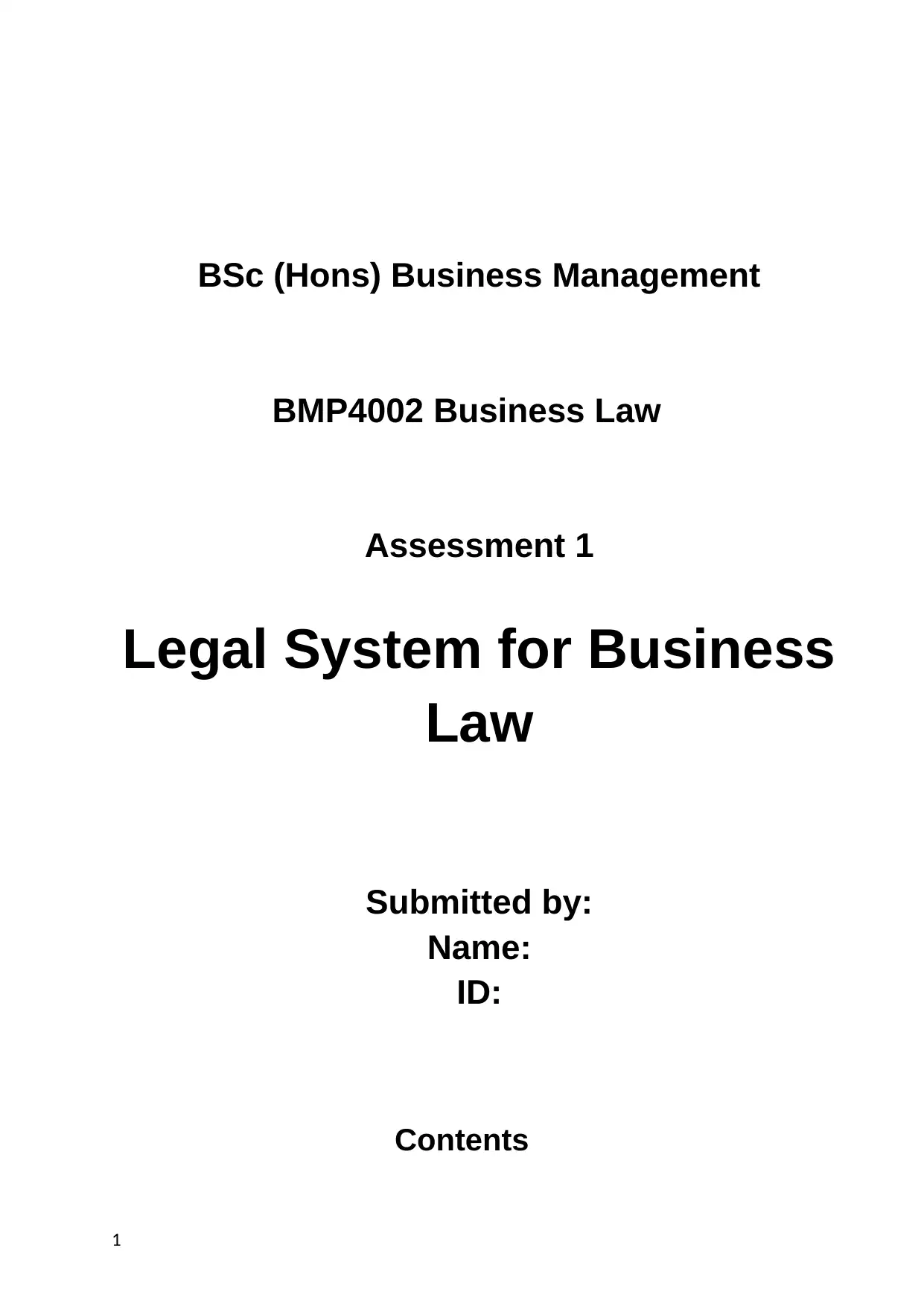
BSc (Hons) Business Management
BMP4002 Business Law
Assessment 1
Legal System for Business
Law
Submitted by:
Name:
ID:
Contents
1
BMP4002 Business Law
Assessment 1
Legal System for Business
Law
Submitted by:
Name:
ID:
Contents
1
Paraphrase This Document
Need a fresh take? Get an instant paraphrase of this document with our AI Paraphraser
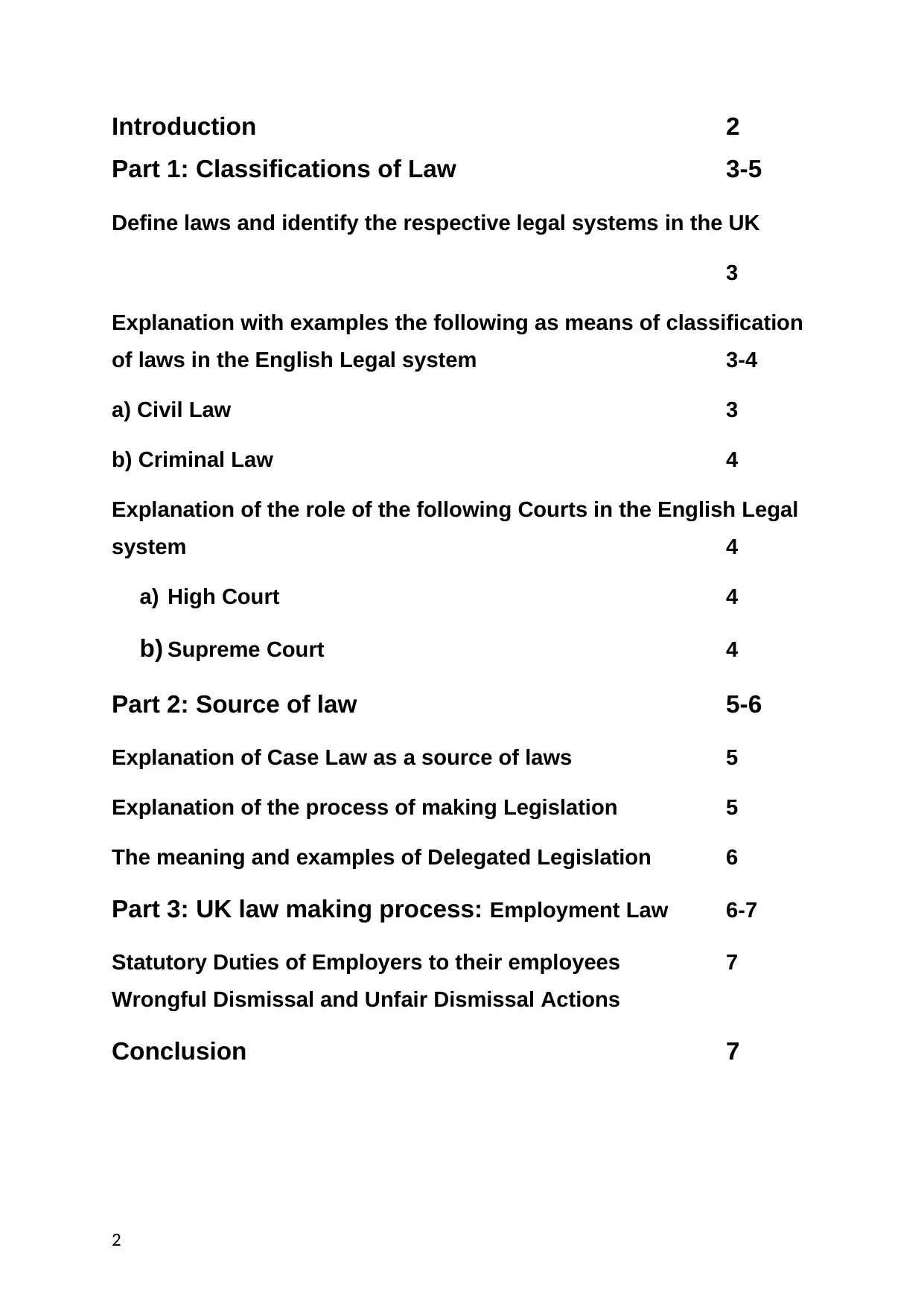
Introduction 2
Part 1: Classifications of Law 3-5
Define laws and identify the respective legal systems in the UK
3
Explanation with examples the following as means of classification
of laws in the English Legal system 3-4
a) Civil Law 3
b) Criminal Law 4
Explanation of the role of the following Courts in the English Legal
system 4
a) High Court 4
b) Supreme Court 4
Part 2: Source of law 5-6
Explanation of Case Law as a source of laws 5
Explanation of the process of making Legislation 5
The meaning and examples of Delegated Legislation 6
Part 3: UK law making process: Employment Law 6-7
Statutory Duties of Employers to their employees 7
Wrongful Dismissal and Unfair Dismissal Actions
Conclusion 7
2
Part 1: Classifications of Law 3-5
Define laws and identify the respective legal systems in the UK
3
Explanation with examples the following as means of classification
of laws in the English Legal system 3-4
a) Civil Law 3
b) Criminal Law 4
Explanation of the role of the following Courts in the English Legal
system 4
a) High Court 4
b) Supreme Court 4
Part 2: Source of law 5-6
Explanation of Case Law as a source of laws 5
Explanation of the process of making Legislation 5
The meaning and examples of Delegated Legislation 6
Part 3: UK law making process: Employment Law 6-7
Statutory Duties of Employers to their employees 7
Wrongful Dismissal and Unfair Dismissal Actions
Conclusion 7
2
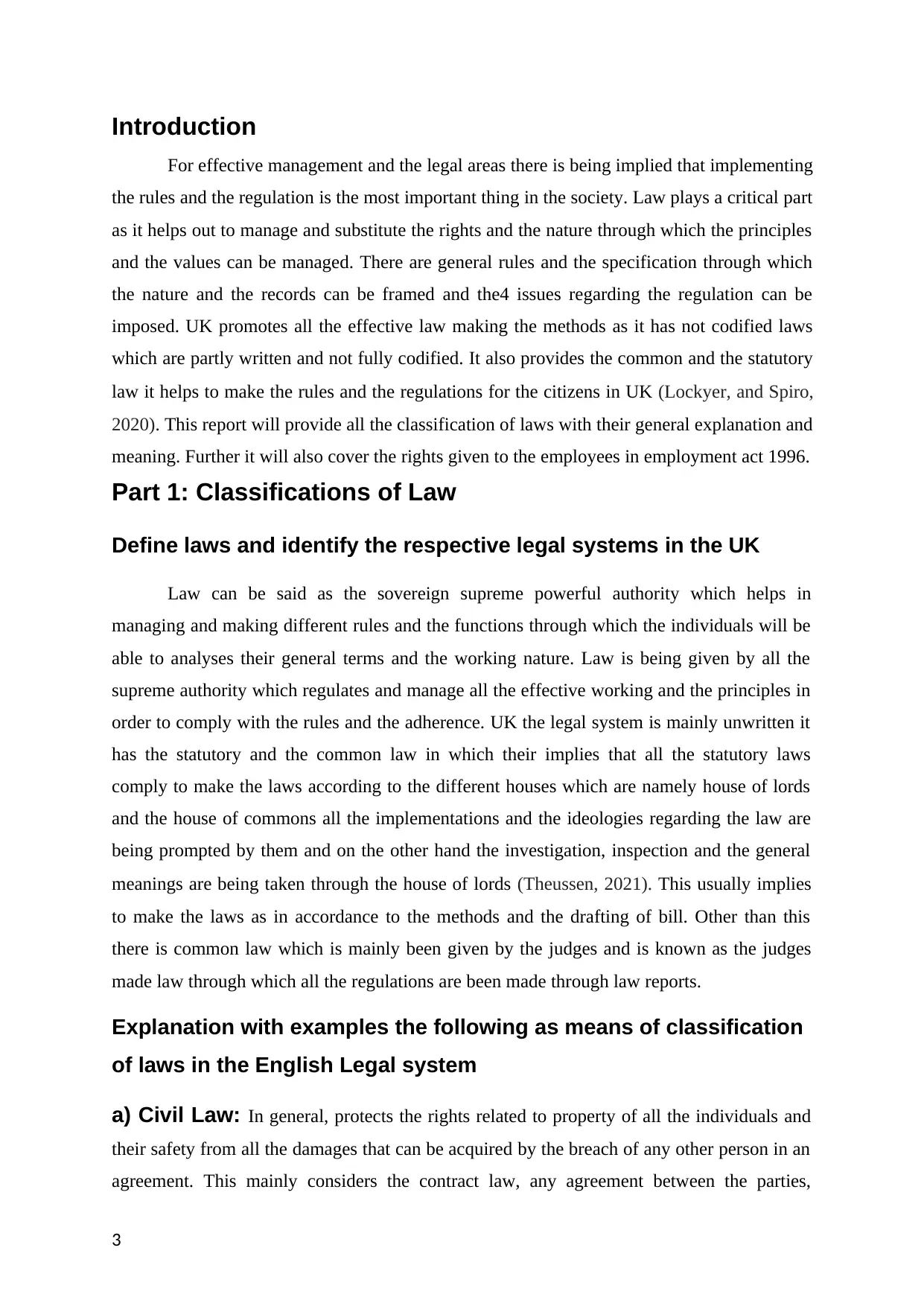
Introduction
For effective management and the legal areas there is being implied that implementing
the rules and the regulation is the most important thing in the society. Law plays a critical part
as it helps out to manage and substitute the rights and the nature through which the principles
and the values can be managed. There are general rules and the specification through which
the nature and the records can be framed and the4 issues regarding the regulation can be
imposed. UK promotes all the effective law making the methods as it has not codified laws
which are partly written and not fully codified. It also provides the common and the statutory
law it helps to make the rules and the regulations for the citizens in UK (Lockyer, and Spiro,
2020). This report will provide all the classification of laws with their general explanation and
meaning. Further it will also cover the rights given to the employees in employment act 1996.
Part 1: Classifications of Law
Define laws and identify the respective legal systems in the UK
Law can be said as the sovereign supreme powerful authority which helps in
managing and making different rules and the functions through which the individuals will be
able to analyses their general terms and the working nature. Law is being given by all the
supreme authority which regulates and manage all the effective working and the principles in
order to comply with the rules and the adherence. UK the legal system is mainly unwritten it
has the statutory and the common law in which their implies that all the statutory laws
comply to make the laws according to the different houses which are namely house of lords
and the house of commons all the implementations and the ideologies regarding the law are
being prompted by them and on the other hand the investigation, inspection and the general
meanings are being taken through the house of lords (Theussen, 2021). This usually implies
to make the laws as in accordance to the methods and the drafting of bill. Other than this
there is common law which is mainly been given by the judges and is known as the judges
made law through which all the regulations are been made through law reports.
Explanation with examples the following as means of classification
of laws in the English Legal system
a) Civil Law: In general, protects the rights related to property of all the individuals and
their safety from all the damages that can be acquired by the breach of any other person in an
agreement. This mainly considers the contract law, any agreement between the parties,
3
For effective management and the legal areas there is being implied that implementing
the rules and the regulation is the most important thing in the society. Law plays a critical part
as it helps out to manage and substitute the rights and the nature through which the principles
and the values can be managed. There are general rules and the specification through which
the nature and the records can be framed and the4 issues regarding the regulation can be
imposed. UK promotes all the effective law making the methods as it has not codified laws
which are partly written and not fully codified. It also provides the common and the statutory
law it helps to make the rules and the regulations for the citizens in UK (Lockyer, and Spiro,
2020). This report will provide all the classification of laws with their general explanation and
meaning. Further it will also cover the rights given to the employees in employment act 1996.
Part 1: Classifications of Law
Define laws and identify the respective legal systems in the UK
Law can be said as the sovereign supreme powerful authority which helps in
managing and making different rules and the functions through which the individuals will be
able to analyses their general terms and the working nature. Law is being given by all the
supreme authority which regulates and manage all the effective working and the principles in
order to comply with the rules and the adherence. UK the legal system is mainly unwritten it
has the statutory and the common law in which their implies that all the statutory laws
comply to make the laws according to the different houses which are namely house of lords
and the house of commons all the implementations and the ideologies regarding the law are
being prompted by them and on the other hand the investigation, inspection and the general
meanings are being taken through the house of lords (Theussen, 2021). This usually implies
to make the laws as in accordance to the methods and the drafting of bill. Other than this
there is common law which is mainly been given by the judges and is known as the judges
made law through which all the regulations are been made through law reports.
Explanation with examples the following as means of classification
of laws in the English Legal system
a) Civil Law: In general, protects the rights related to property of all the individuals and
their safety from all the damages that can be acquired by the breach of any other person in an
agreement. This mainly considers the contract law, any agreement between the parties,
3
⊘ This is a preview!⊘
Do you want full access?
Subscribe today to unlock all pages.

Trusted by 1+ million students worldwide
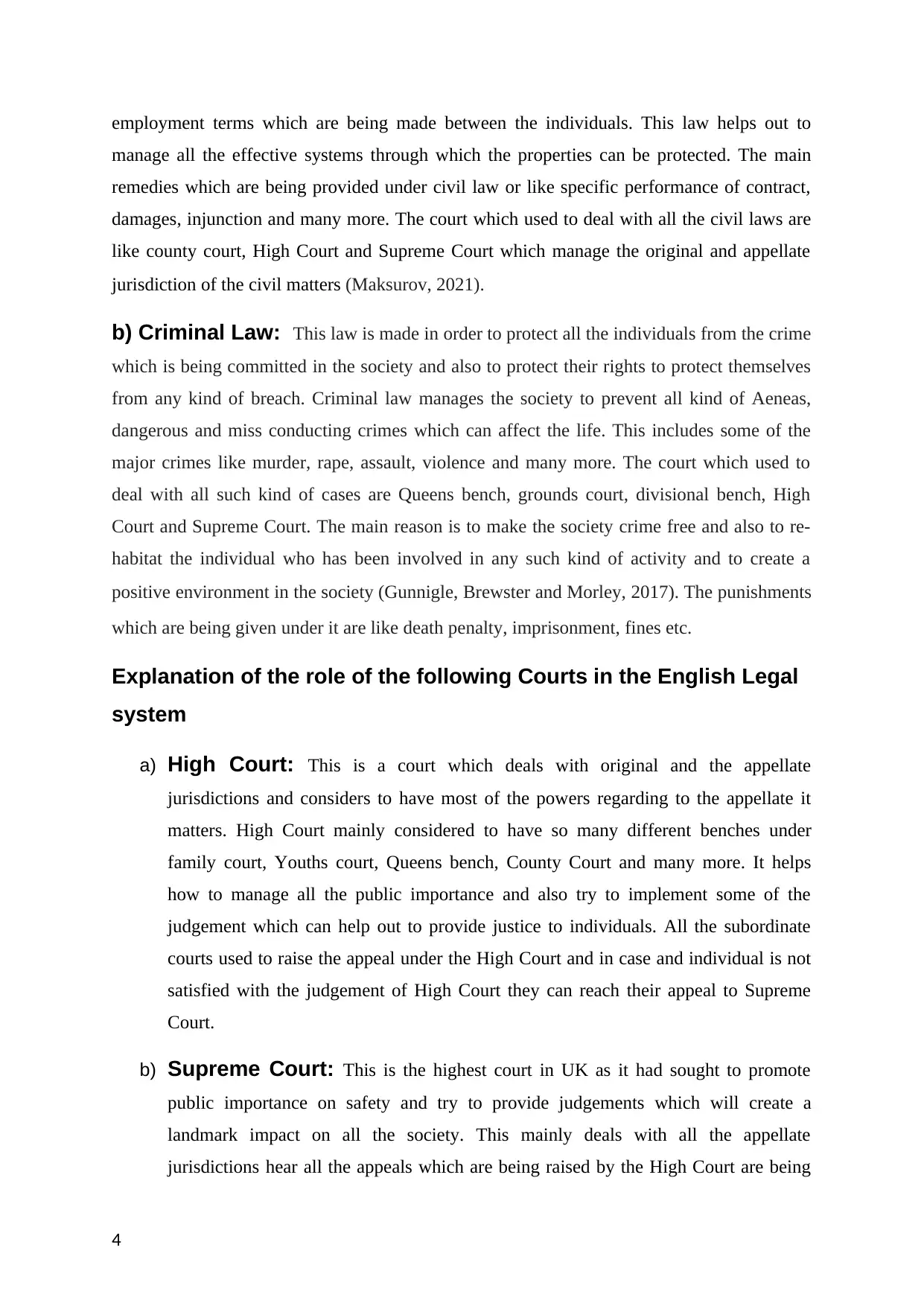
employment terms which are being made between the individuals. This law helps out to
manage all the effective systems through which the properties can be protected. The main
remedies which are being provided under civil law or like specific performance of contract,
damages, injunction and many more. The court which used to deal with all the civil laws are
like county court, High Court and Supreme Court which manage the original and appellate
jurisdiction of the civil matters (Maksurov, 2021).
b) Criminal Law: This law is made in order to protect all the individuals from the crime
which is being committed in the society and also to protect their rights to protect themselves
from any kind of breach. Criminal law manages the society to prevent all kind of Aeneas,
dangerous and miss conducting crimes which can affect the life. This includes some of the
major crimes like murder, rape, assault, violence and many more. The court which used to
deal with all such kind of cases are Queens bench, grounds court, divisional bench, High
Court and Supreme Court. The main reason is to make the society crime free and also to re-
habitat the individual who has been involved in any such kind of activity and to create a
positive environment in the society (Gunnigle, Brewster and Morley, 2017). The punishments
which are being given under it are like death penalty, imprisonment, fines etc.
Explanation of the role of the following Courts in the English Legal
system
a) High Court: This is a court which deals with original and the appellate
jurisdictions and considers to have most of the powers regarding to the appellate it
matters. High Court mainly considered to have so many different benches under
family court, Youths court, Queens bench, County Court and many more. It helps
how to manage all the public importance and also try to implement some of the
judgement which can help out to provide justice to individuals. All the subordinate
courts used to raise the appeal under the High Court and in case and individual is not
satisfied with the judgement of High Court they can reach their appeal to Supreme
Court.
b) Supreme Court: This is the highest court in UK as it had sought to promote
public importance on safety and try to provide judgements which will create a
landmark impact on all the society. This mainly deals with all the appellate
jurisdictions hear all the appeals which are being raised by the High Court are being
4
manage all the effective systems through which the properties can be protected. The main
remedies which are being provided under civil law or like specific performance of contract,
damages, injunction and many more. The court which used to deal with all the civil laws are
like county court, High Court and Supreme Court which manage the original and appellate
jurisdiction of the civil matters (Maksurov, 2021).
b) Criminal Law: This law is made in order to protect all the individuals from the crime
which is being committed in the society and also to protect their rights to protect themselves
from any kind of breach. Criminal law manages the society to prevent all kind of Aeneas,
dangerous and miss conducting crimes which can affect the life. This includes some of the
major crimes like murder, rape, assault, violence and many more. The court which used to
deal with all such kind of cases are Queens bench, grounds court, divisional bench, High
Court and Supreme Court. The main reason is to make the society crime free and also to re-
habitat the individual who has been involved in any such kind of activity and to create a
positive environment in the society (Gunnigle, Brewster and Morley, 2017). The punishments
which are being given under it are like death penalty, imprisonment, fines etc.
Explanation of the role of the following Courts in the English Legal
system
a) High Court: This is a court which deals with original and the appellate
jurisdictions and considers to have most of the powers regarding to the appellate it
matters. High Court mainly considered to have so many different benches under
family court, Youths court, Queens bench, County Court and many more. It helps
how to manage all the public importance and also try to implement some of the
judgement which can help out to provide justice to individuals. All the subordinate
courts used to raise the appeal under the High Court and in case and individual is not
satisfied with the judgement of High Court they can reach their appeal to Supreme
Court.
b) Supreme Court: This is the highest court in UK as it had sought to promote
public importance on safety and try to provide judgements which will create a
landmark impact on all the society. This mainly deals with all the appellate
jurisdictions hear all the appeals which are being raised by the High Court are being
4
Paraphrase This Document
Need a fresh take? Get an instant paraphrase of this document with our AI Paraphraser
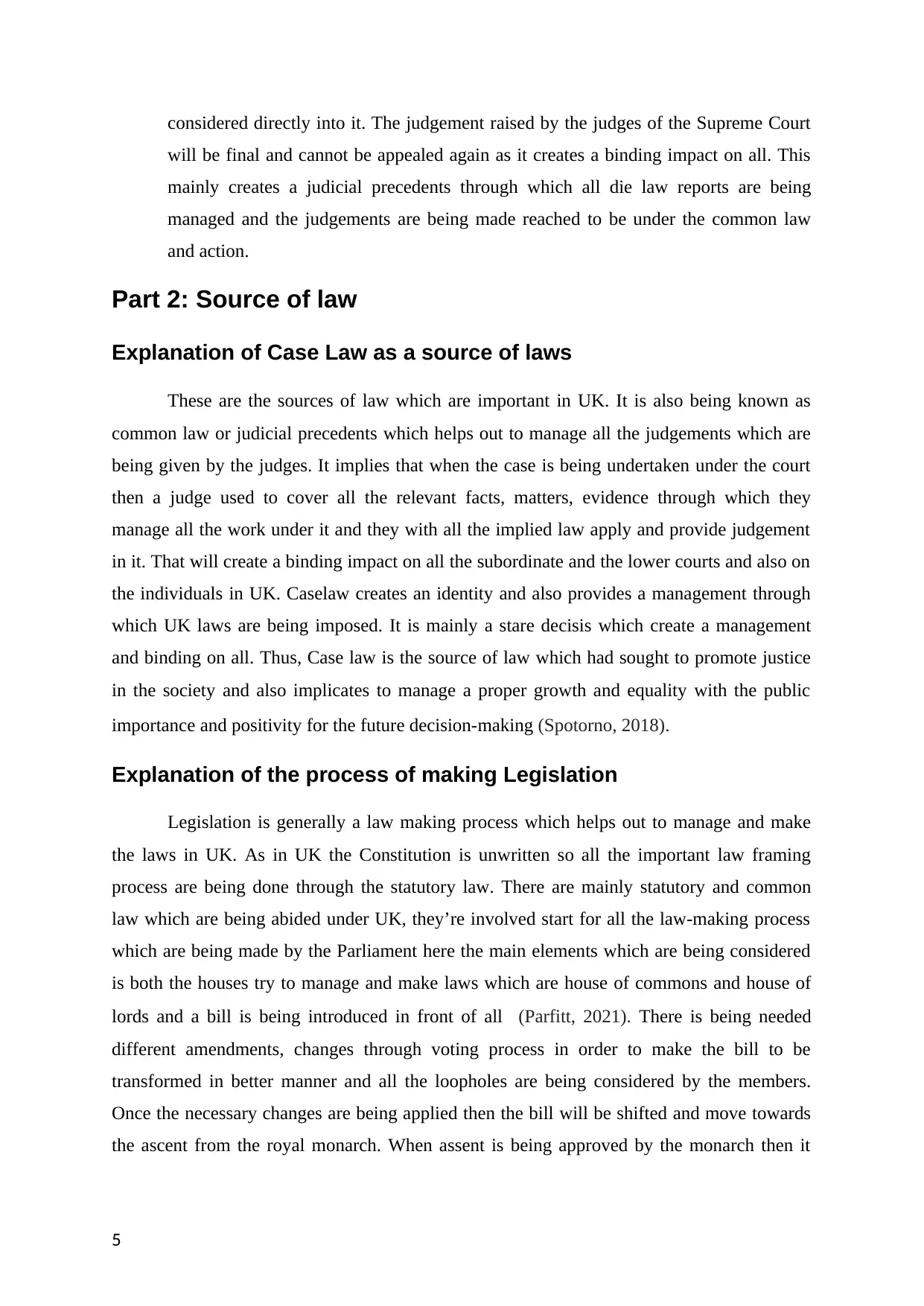
considered directly into it. The judgement raised by the judges of the Supreme Court
will be final and cannot be appealed again as it creates a binding impact on all. This
mainly creates a judicial precedents through which all die law reports are being
managed and the judgements are being made reached to be under the common law
and action.
Part 2: Source of law
Explanation of Case Law as a source of laws
These are the sources of law which are important in UK. It is also being known as
common law or judicial precedents which helps out to manage all the judgements which are
being given by the judges. It implies that when the case is being undertaken under the court
then a judge used to cover all the relevant facts, matters, evidence through which they
manage all the work under it and they with all the implied law apply and provide judgement
in it. That will create a binding impact on all the subordinate and the lower courts and also on
the individuals in UK. Caselaw creates an identity and also provides a management through
which UK laws are being imposed. It is mainly a stare decisis which create a management
and binding on all. Thus, Case law is the source of law which had sought to promote justice
in the society and also implicates to manage a proper growth and equality with the public
importance and positivity for the future decision-making (Spotorno, 2018).
Explanation of the process of making Legislation
Legislation is generally a law making process which helps out to manage and make
the laws in UK. As in UK the Constitution is unwritten so all the important law framing
process are being done through the statutory law. There are mainly statutory and common
law which are being abided under UK, they’re involved start for all the law-making process
which are being made by the Parliament here the main elements which are being considered
is both the houses try to manage and make laws which are house of commons and house of
lords and a bill is being introduced in front of all (Parfitt, 2021). There is being needed
different amendments, changes through voting process in order to make the bill to be
transformed in better manner and all the loopholes are being considered by the members.
Once the necessary changes are being applied then the bill will be shifted and move towards
the ascent from the royal monarch. When assent is being approved by the monarch then it
5
will be final and cannot be appealed again as it creates a binding impact on all. This
mainly creates a judicial precedents through which all die law reports are being
managed and the judgements are being made reached to be under the common law
and action.
Part 2: Source of law
Explanation of Case Law as a source of laws
These are the sources of law which are important in UK. It is also being known as
common law or judicial precedents which helps out to manage all the judgements which are
being given by the judges. It implies that when the case is being undertaken under the court
then a judge used to cover all the relevant facts, matters, evidence through which they
manage all the work under it and they with all the implied law apply and provide judgement
in it. That will create a binding impact on all the subordinate and the lower courts and also on
the individuals in UK. Caselaw creates an identity and also provides a management through
which UK laws are being imposed. It is mainly a stare decisis which create a management
and binding on all. Thus, Case law is the source of law which had sought to promote justice
in the society and also implicates to manage a proper growth and equality with the public
importance and positivity for the future decision-making (Spotorno, 2018).
Explanation of the process of making Legislation
Legislation is generally a law making process which helps out to manage and make
the laws in UK. As in UK the Constitution is unwritten so all the important law framing
process are being done through the statutory law. There are mainly statutory and common
law which are being abided under UK, they’re involved start for all the law-making process
which are being made by the Parliament here the main elements which are being considered
is both the houses try to manage and make laws which are house of commons and house of
lords and a bill is being introduced in front of all (Parfitt, 2021). There is being needed
different amendments, changes through voting process in order to make the bill to be
transformed in better manner and all the loopholes are being considered by the members.
Once the necessary changes are being applied then the bill will be shifted and move towards
the ascent from the royal monarch. When assent is being approved by the monarch then it
5
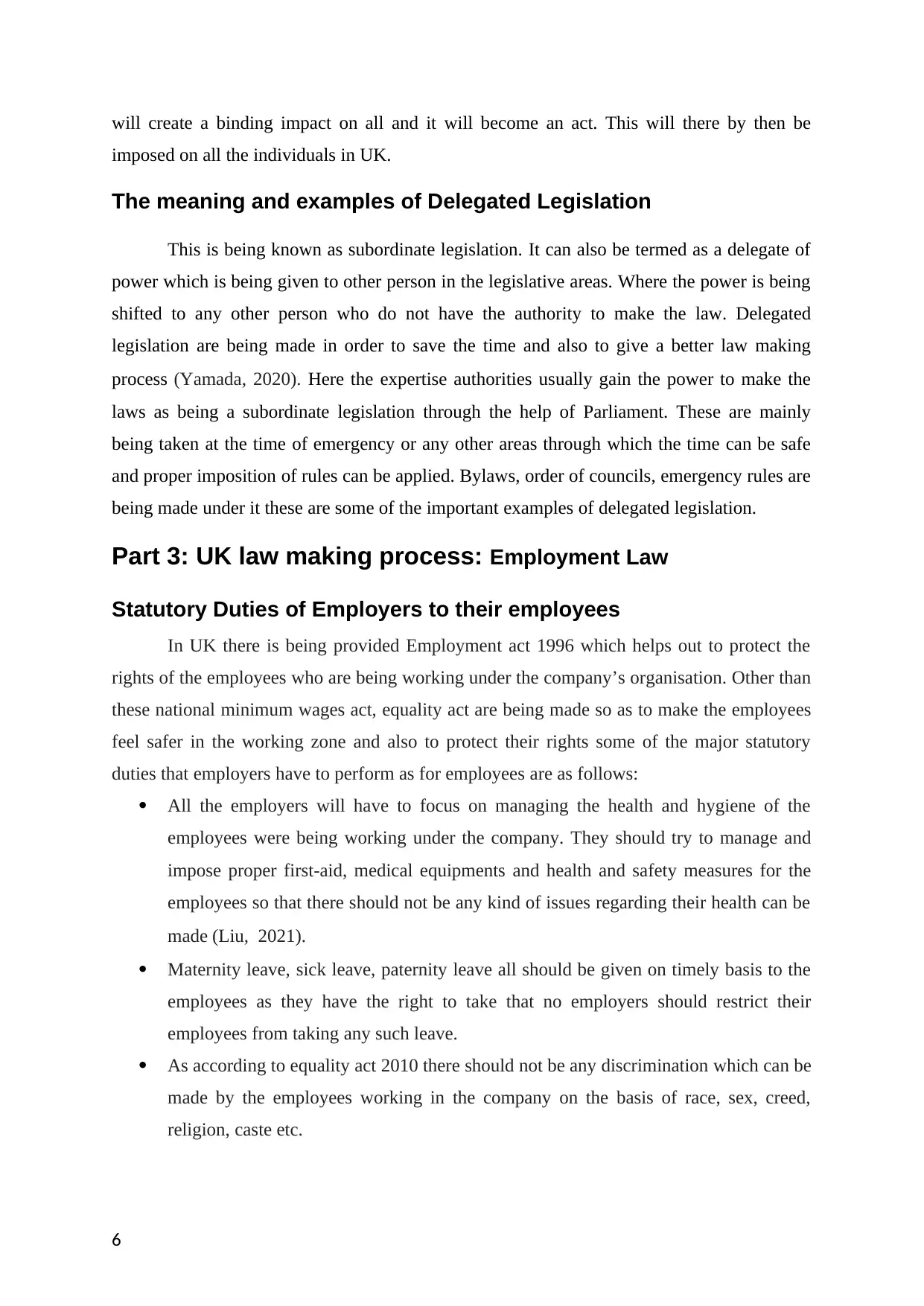
will create a binding impact on all and it will become an act. This will there by then be
imposed on all the individuals in UK.
The meaning and examples of Delegated Legislation
This is being known as subordinate legislation. It can also be termed as a delegate of
power which is being given to other person in the legislative areas. Where the power is being
shifted to any other person who do not have the authority to make the law. Delegated
legislation are being made in order to save the time and also to give a better law making
process (Yamada, 2020). Here the expertise authorities usually gain the power to make the
laws as being a subordinate legislation through the help of Parliament. These are mainly
being taken at the time of emergency or any other areas through which the time can be safe
and proper imposition of rules can be applied. Bylaws, order of councils, emergency rules are
being made under it these are some of the important examples of delegated legislation.
Part 3: UK law making process: Employment Law
Statutory Duties of Employers to their employees
In UK there is being provided Employment act 1996 which helps out to protect the
rights of the employees who are being working under the company’s organisation. Other than
these national minimum wages act, equality act are being made so as to make the employees
feel safer in the working zone and also to protect their rights some of the major statutory
duties that employers have to perform as for employees are as follows:
All the employers will have to focus on managing the health and hygiene of the
employees were being working under the company. They should try to manage and
impose proper first-aid, medical equipments and health and safety measures for the
employees so that there should not be any kind of issues regarding their health can be
made (Liu, 2021).
Maternity leave, sick leave, paternity leave all should be given on timely basis to the
employees as they have the right to take that no employers should restrict their
employees from taking any such leave.
As according to equality act 2010 there should not be any discrimination which can be
made by the employees working in the company on the basis of race, sex, creed,
religion, caste etc.
6
imposed on all the individuals in UK.
The meaning and examples of Delegated Legislation
This is being known as subordinate legislation. It can also be termed as a delegate of
power which is being given to other person in the legislative areas. Where the power is being
shifted to any other person who do not have the authority to make the law. Delegated
legislation are being made in order to save the time and also to give a better law making
process (Yamada, 2020). Here the expertise authorities usually gain the power to make the
laws as being a subordinate legislation through the help of Parliament. These are mainly
being taken at the time of emergency or any other areas through which the time can be safe
and proper imposition of rules can be applied. Bylaws, order of councils, emergency rules are
being made under it these are some of the important examples of delegated legislation.
Part 3: UK law making process: Employment Law
Statutory Duties of Employers to their employees
In UK there is being provided Employment act 1996 which helps out to protect the
rights of the employees who are being working under the company’s organisation. Other than
these national minimum wages act, equality act are being made so as to make the employees
feel safer in the working zone and also to protect their rights some of the major statutory
duties that employers have to perform as for employees are as follows:
All the employers will have to focus on managing the health and hygiene of the
employees were being working under the company. They should try to manage and
impose proper first-aid, medical equipments and health and safety measures for the
employees so that there should not be any kind of issues regarding their health can be
made (Liu, 2021).
Maternity leave, sick leave, paternity leave all should be given on timely basis to the
employees as they have the right to take that no employers should restrict their
employees from taking any such leave.
As according to equality act 2010 there should not be any discrimination which can be
made by the employees working in the company on the basis of race, sex, creed,
religion, caste etc.
6
⊘ This is a preview!⊘
Do you want full access?
Subscribe today to unlock all pages.

Trusted by 1+ million students worldwide
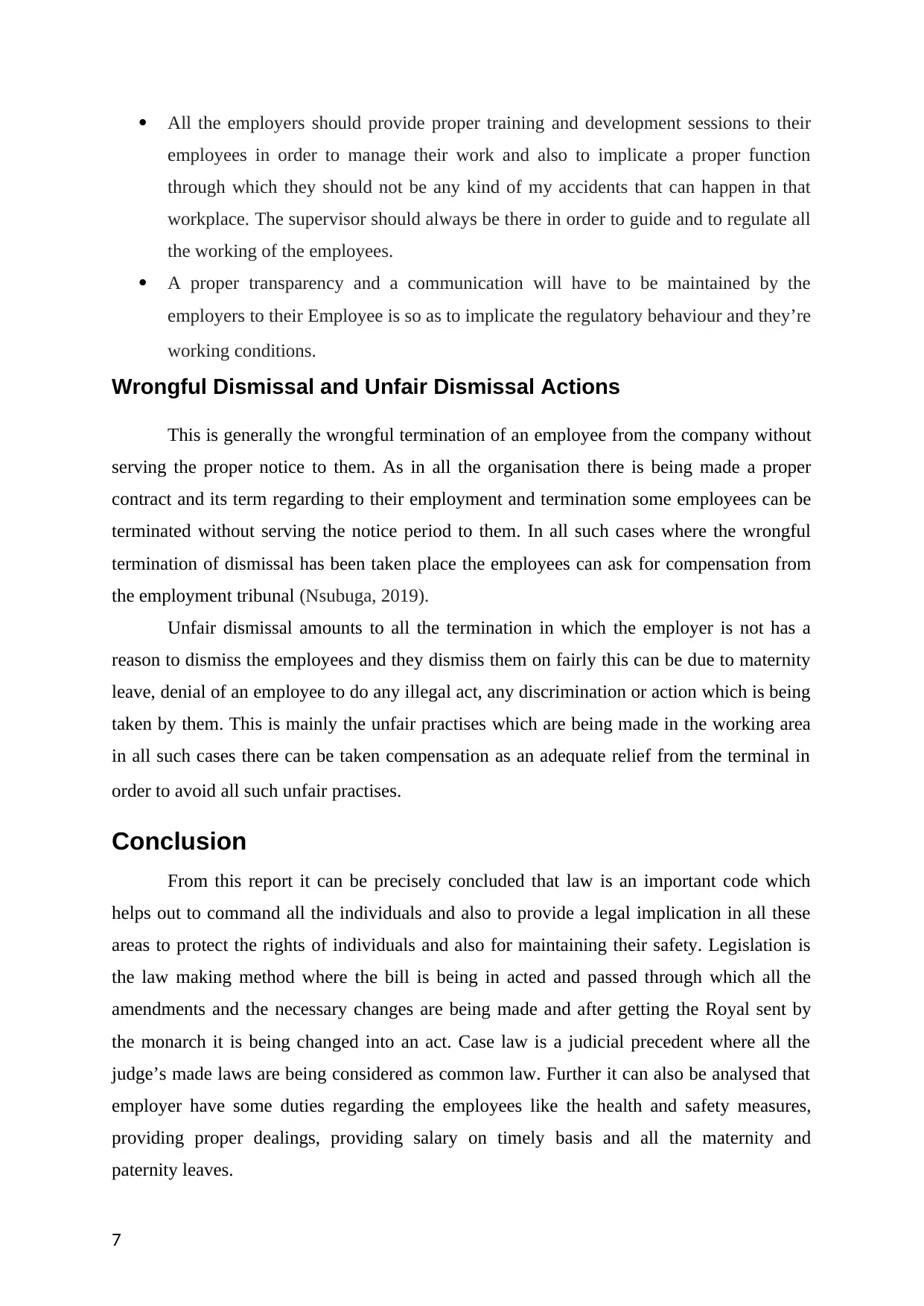
All the employers should provide proper training and development sessions to their
employees in order to manage their work and also to implicate a proper function
through which they should not be any kind of my accidents that can happen in that
workplace. The supervisor should always be there in order to guide and to regulate all
the working of the employees.
A proper transparency and a communication will have to be maintained by the
employers to their Employee is so as to implicate the regulatory behaviour and they’re
working conditions.
Wrongful Dismissal and Unfair Dismissal Actions
This is generally the wrongful termination of an employee from the company without
serving the proper notice to them. As in all the organisation there is being made a proper
contract and its term regarding to their employment and termination some employees can be
terminated without serving the notice period to them. In all such cases where the wrongful
termination of dismissal has been taken place the employees can ask for compensation from
the employment tribunal (Nsubuga, 2019).
Unfair dismissal amounts to all the termination in which the employer is not has a
reason to dismiss the employees and they dismiss them on fairly this can be due to maternity
leave, denial of an employee to do any illegal act, any discrimination or action which is being
taken by them. This is mainly the unfair practises which are being made in the working area
in all such cases there can be taken compensation as an adequate relief from the terminal in
order to avoid all such unfair practises.
Conclusion
From this report it can be precisely concluded that law is an important code which
helps out to command all the individuals and also to provide a legal implication in all these
areas to protect the rights of individuals and also for maintaining their safety. Legislation is
the law making method where the bill is being in acted and passed through which all the
amendments and the necessary changes are being made and after getting the Royal sent by
the monarch it is being changed into an act. Case law is a judicial precedent where all the
judge’s made laws are being considered as common law. Further it can also be analysed that
employer have some duties regarding the employees like the health and safety measures,
providing proper dealings, providing salary on timely basis and all the maternity and
paternity leaves.
7
employees in order to manage their work and also to implicate a proper function
through which they should not be any kind of my accidents that can happen in that
workplace. The supervisor should always be there in order to guide and to regulate all
the working of the employees.
A proper transparency and a communication will have to be maintained by the
employers to their Employee is so as to implicate the regulatory behaviour and they’re
working conditions.
Wrongful Dismissal and Unfair Dismissal Actions
This is generally the wrongful termination of an employee from the company without
serving the proper notice to them. As in all the organisation there is being made a proper
contract and its term regarding to their employment and termination some employees can be
terminated without serving the notice period to them. In all such cases where the wrongful
termination of dismissal has been taken place the employees can ask for compensation from
the employment tribunal (Nsubuga, 2019).
Unfair dismissal amounts to all the termination in which the employer is not has a
reason to dismiss the employees and they dismiss them on fairly this can be due to maternity
leave, denial of an employee to do any illegal act, any discrimination or action which is being
taken by them. This is mainly the unfair practises which are being made in the working area
in all such cases there can be taken compensation as an adequate relief from the terminal in
order to avoid all such unfair practises.
Conclusion
From this report it can be precisely concluded that law is an important code which
helps out to command all the individuals and also to provide a legal implication in all these
areas to protect the rights of individuals and also for maintaining their safety. Legislation is
the law making method where the bill is being in acted and passed through which all the
amendments and the necessary changes are being made and after getting the Royal sent by
the monarch it is being changed into an act. Case law is a judicial precedent where all the
judge’s made laws are being considered as common law. Further it can also be analysed that
employer have some duties regarding the employees like the health and safety measures,
providing proper dealings, providing salary on timely basis and all the maternity and
paternity leaves.
7
Paraphrase This Document
Need a fresh take? Get an instant paraphrase of this document with our AI Paraphraser
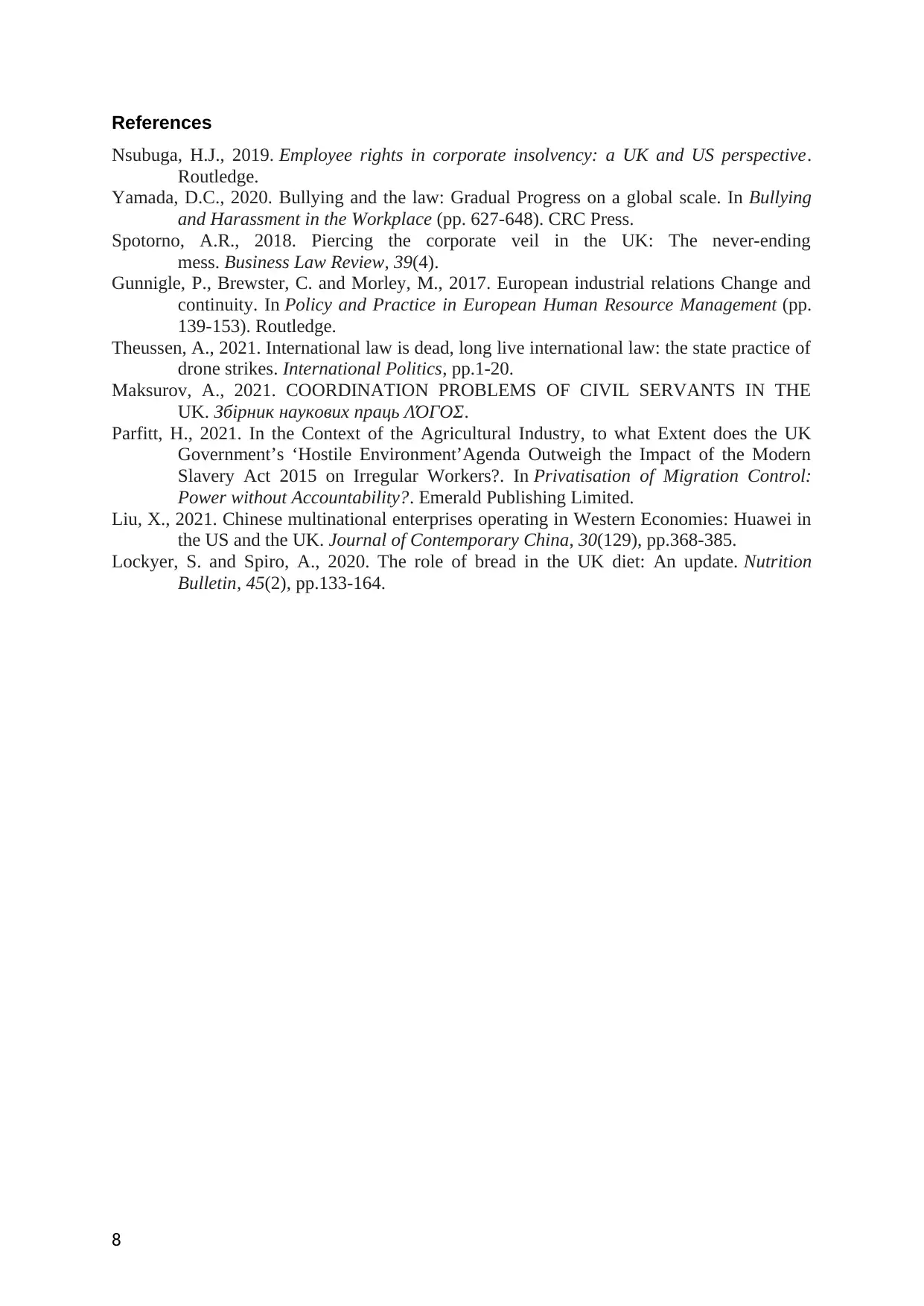
References
Nsubuga, H.J., 2019. Employee rights in corporate insolvency: a UK and US perspective.
Routledge.
Yamada, D.C., 2020. Bullying and the law: Gradual Progress on a global scale. In Bullying
and Harassment in the Workplace (pp. 627-648). CRC Press.
Spotorno, A.R., 2018. Piercing the corporate veil in the UK: The never-ending
mess. Business Law Review, 39(4).
Gunnigle, P., Brewster, C. and Morley, M., 2017. European industrial relations Change and
continuity. In Policy and Practice in European Human Resource Management (pp.
139-153). Routledge.
Theussen, A., 2021. International law is dead, long live international law: the state practice of
drone strikes. International Politics, pp.1-20.
Maksurov, A., 2021. COORDINATION PROBLEMS OF CIVIL SERVANTS IN THE
UK. Збірник наукових праць ΛΌГOΣ.
Parfitt, H., 2021. In the Context of the Agricultural Industry, to what Extent does the UK
Government’s ‘Hostile Environment’Agenda Outweigh the Impact of the Modern
Slavery Act 2015 on Irregular Workers?. In Privatisation of Migration Control:
Power without Accountability?. Emerald Publishing Limited.
Liu, X., 2021. Chinese multinational enterprises operating in Western Economies: Huawei in
the US and the UK. Journal of Contemporary China, 30(129), pp.368-385.
Lockyer, S. and Spiro, A., 2020. The role of bread in the UK diet: An update. Nutrition
Bulletin, 45(2), pp.133-164.
8
Nsubuga, H.J., 2019. Employee rights in corporate insolvency: a UK and US perspective.
Routledge.
Yamada, D.C., 2020. Bullying and the law: Gradual Progress on a global scale. In Bullying
and Harassment in the Workplace (pp. 627-648). CRC Press.
Spotorno, A.R., 2018. Piercing the corporate veil in the UK: The never-ending
mess. Business Law Review, 39(4).
Gunnigle, P., Brewster, C. and Morley, M., 2017. European industrial relations Change and
continuity. In Policy and Practice in European Human Resource Management (pp.
139-153). Routledge.
Theussen, A., 2021. International law is dead, long live international law: the state practice of
drone strikes. International Politics, pp.1-20.
Maksurov, A., 2021. COORDINATION PROBLEMS OF CIVIL SERVANTS IN THE
UK. Збірник наукових праць ΛΌГOΣ.
Parfitt, H., 2021. In the Context of the Agricultural Industry, to what Extent does the UK
Government’s ‘Hostile Environment’Agenda Outweigh the Impact of the Modern
Slavery Act 2015 on Irregular Workers?. In Privatisation of Migration Control:
Power without Accountability?. Emerald Publishing Limited.
Liu, X., 2021. Chinese multinational enterprises operating in Western Economies: Huawei in
the US and the UK. Journal of Contemporary China, 30(129), pp.368-385.
Lockyer, S. and Spiro, A., 2020. The role of bread in the UK diet: An update. Nutrition
Bulletin, 45(2), pp.133-164.
8
1 out of 8
Related Documents
Your All-in-One AI-Powered Toolkit for Academic Success.
+13062052269
info@desklib.com
Available 24*7 on WhatsApp / Email
![[object Object]](/_next/static/media/star-bottom.7253800d.svg)
Unlock your academic potential
Copyright © 2020–2026 A2Z Services. All Rights Reserved. Developed and managed by ZUCOL.

